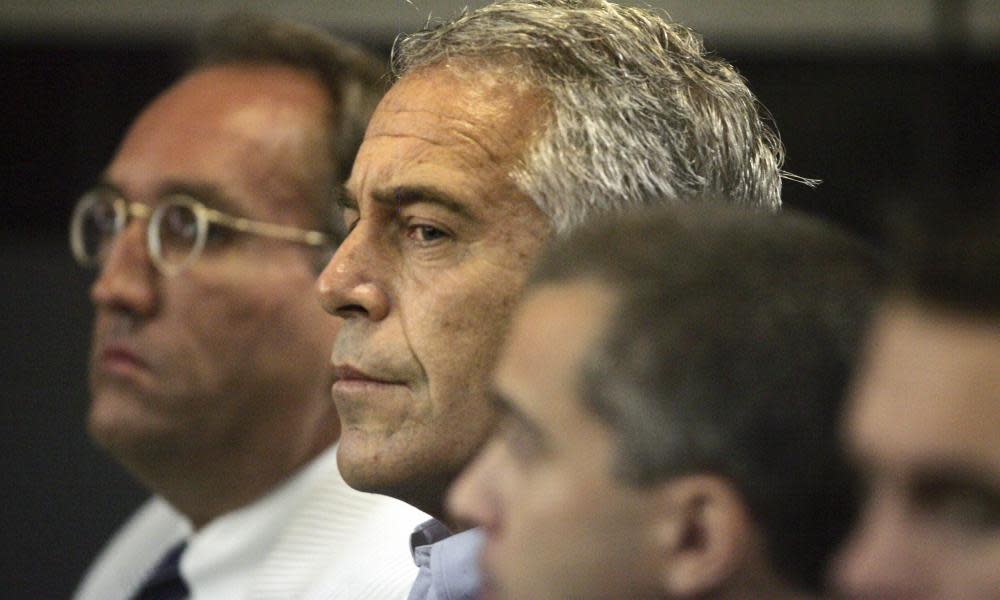After Prince Andrew settled, where does the Epstein case go next?

- Oops!Something went wrong.Please try again later.
After news of Prince Andrew’s settlement with his accuser Virginia Giuffre, the question of who or what the tentacles of the Jeffrey Epstein and Ghislaine Maxwell sex-trafficking conspiracy will envelope next remains.
New York attorneys believe it is unlikely any more will be said by the parties involved in Andrew’s case, assuming the senior British royal keeps to the agreed settlement. The letter that accompanied the court filing last week, agreed by both sides, was unusually explicit and calculated to the purpose of settling the matter for good.
Related: Prince Andrew’s ‘arrogance’ prevented earlier settlement, lawyers say
“It gave Giuffre something, including recognition that she’d been a victim of sex trafficking, but not everything she wanted, including an admission of guilt,” said the New York lawyer Julie Rendelman.
But attention will now return to a slew of other unfinished business stemming from the sex-trafficking ring run by the disgraced financier Epstein, his one-time girlfriend Maxwell and possibly others. Certainly the nature of the circles that Epstein moved in – powerful, elite, famous and wealthy – make continued interest by media and law enforcement inevitable.
The loose ends in the Epstein saga include the outcome of challenges to Maxwell’s conviction and her yet-to-be scheduled sentencing over the summer, which will include victims’ impact statements. There is also the question of prosecutors’ appetite to reach down the conspiracy chain and the disposition of about $440m left in Epstein’s estate after $121m was paid out to victims through a compensation fund. Finally, there is potential for a new round of civil claims against those involved in the sex-trafficking conspiracy.
But the release of the names of 16 “John Does” – in effect, potential clients of the conspiracy – that were redacted from depositions in Virginia Giuffre’s defamation lawsuit against Maxwell may initially produce little more than headlines.
Maxwell, who was returned to Brooklyn’s Metropolitan detention center, where she has been held in isolation since her arrest in July 2020, has said she no longer wishes to fight the release of men’s identities. “Each of the listed Does has counsel who have ably asserted their own respective privacy rights. Ms Maxwell therefore leaves it to this Court to conduct the appropriate review,” her lawyers wrote.
“Generalized aversion to embarrassment and negativity … is not enough to warrant continued sealing of information,” Giuffre’s attorney Sigrid McCawley wrote to the court. “There is little reason to retain protection over the vast swaths of information about Epstein and Maxwell’s sex-trafficking operation.”
It’s up to Judge Loretta Preska, who presided over the Giuffre-Maxwell action, to unseal them. When Preska previously ordered the release of testimony, she said that claims to privacy were “far outweighed by the presumption of public access”.
That in turn could lead to a wave of new civil cases, said Professor Marci Hamilton, an expert on child sex abuse statutes of limitations at the University of Pennsylvania and CEO of Child USA, citing a New York City law that allows sex abuse cases outside the normal statute of limitations to be brought. The law goes into effect in September, and opens for cases to be filed in March 2023.
“It’s not over for the survivors and we’ll see new lawsuits against Epstein’s co-conspirators – the men who willingly accepted the girls to abuse them, the men who were frequently in his space. As of March, any woman will have her claims revived and be able to sue any and everybody involved in the Epstein system, even if they have received compensation for the Epstein victim’s fund.”
Hamilton was involved in advising both the compensation fund and the US Virgin Islands attorney general, Denise George, who filed claims against Epstein’s estate.
While most say the fund was administered fairly, the overall amount released by the estate to compensate Epstein’s victims is questioned. “In the end I was disappointed that more women weren’t compensated higher dollars. Reserving so much of it just didn’t seem like a laudable goal,” says Hamilton.

Arick Fudali, a lawyer with the Bloom Firm that represented eight women to the fund, said he had mixed feelings. “It was a good opportunity for them to have their voices heard in a non-confrontational way and get some measure of justice. But I think every single penny from Jeffrey Epstein’s estate should have gone to victims, and I fault the program for leaving any money in the estate.”
Late last year, the Virgin Islands’ George asked the British bank Barclays to hand over information related to Epstein, days after its former chief executive Jes Staley left the bank over his ties to the financier that included unexplained emails referring to “snow white”. Barclays said it had “complied with its obligations”.
These issues have been dragging for years. But, with a saga as sprawling as the Epstein scandal, new wrinkles are constantly appearing. There is now pending, and highly contentious, litigation between the multibillionaire former Apollo CEO Leon Black and his former mistress Guzel Ganieva, who claims she was trafficked to Epstein.
Black denies the allegation and has countersued in federal court, claiming that his former business partner, Josh Harris, masterminded a smear campaign in 2021 to “destroy” him.
But the question of whether the justice department itself wants to go after others lower down in the Epstein-Maxwell conspiracy – “reaching down”, in prosecutorial terms – remains open.
Following Maxwell’s conviction, the government dropped perjury charges against the ex-British socialite and complaints against two detention guards who failed to keep watch over Epstein the night he took his life. Lawyers for members of Epstein’s personal staff, including Sarah Kellen, have indicated Epstein’s staff are not in the frame.
“I don’t believe there will be further criminal charges,” said Rendelman.
The next criminal aspect of the Epstein conspiracy would then be Maxwell’s sentencing. Maxwell’s defense attorneys will submit a lengthy motion – typically public record – incorporating every positive aspect of Maxwell’s life – lack of criminal record, any time of community service, her family background, mental health.
“You name it, they’ll include it in an effort to get the judge to go as low as possible in terms of sentencing guidelines,” said Rendelman.
But that assumes her conviction survives expected motions for a mistrial on various grounds, including two jurors saying they had omitted from a pre-trial questionnaire that they had been sexually abused as children and may later have helped shape jury deliberations.
If Maxwell seeks to overturn the verdict, or launch an appeal, any cooperation she might offer the government in exchange for a lighter sentence, would probably fail, said David Weinstein, a former assistant US attorney in the southern district of Florida.
“It’s always been a practice and policy of the Department of Justice that if you’re pursuing an appeal of your conviction, then we’re not interested in having you cooperate with us because you’re not really cooperating, you’re fighting with us.”
On the other hand, if she offered to cooperate against high-value individuals who were equal or only slightly lower down, that might be something the government would be interested in.
“Epstein was their big target. Maxwell was their No 2, who became No 1. There may be some high-profile individuals involved, but for the most part they were not necessarily co-conspirators recruiting and providing victims but rather – and for lack of a better word - their services,” Weinstein said.
For Andrew, his immediate legal woes are over, even though a horrific PR problem remains. But for others, just maybe, their troubles might be just beginning.

